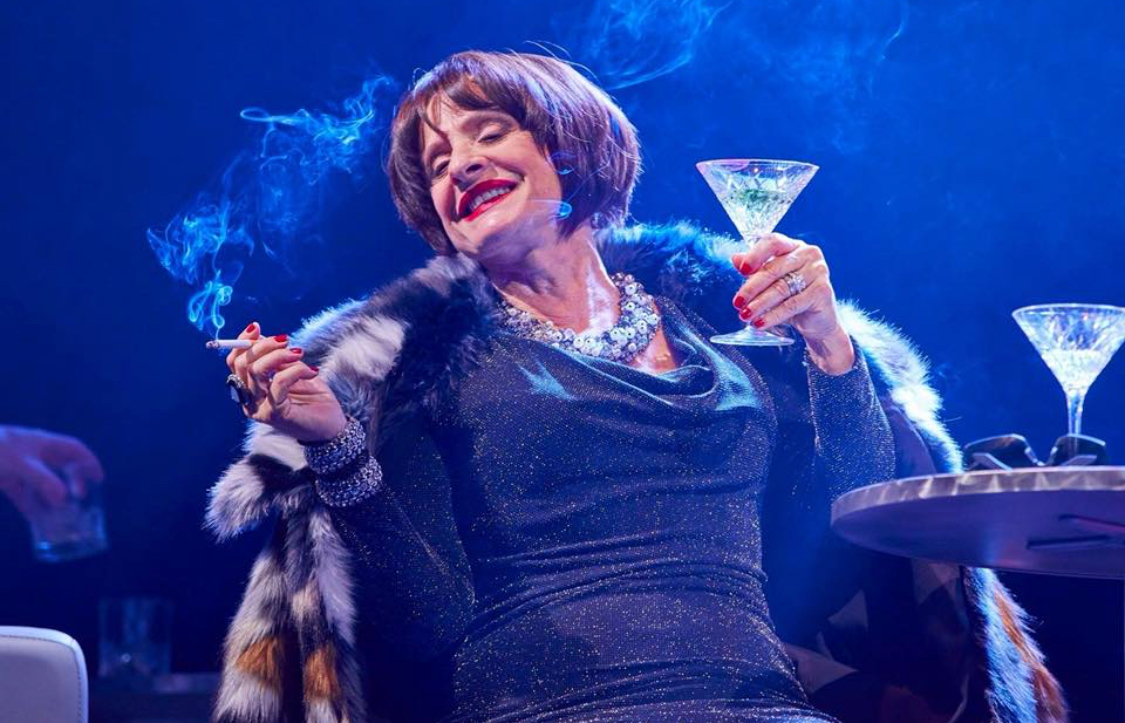OLEANNA Reviews
#1OLEANNA Reviews
Posted: 10/11/09 at 1:51am
Post 'em here!
Today is Sunday, October 11th, marking the official opening night of David Mamet's OLEANNA, starring Bill Pullman and Julia Stiles. Having previously played Off-Broadway, and at the Mark Taper Forum in Los Angeles last summer, this mounting is the Broadway premiere, playing The Golden Theater. Preview performances began September 29th. Directed by Doug Hughes.
"The play focuses on the relationship between an intimidating university professor on the verge of obtaining tenure, and a timid female student who is having difficulty with the concepts in his classroom," begin press notes. "Neither one is who or what he/she seems, and in the end, an act of sexual harassment may or may not occur. Oleanna is often described as Mamet's attack on political correctness."
Tickets are currently on sale through March 7, 2010.
The absolute to cast and crew!
Updated On: 10/11/09 at 01:51 AM
#2re: OLEANNA Reviews
Posted: 10/11/09 at 2:16amThese reviews are definitely going to be interesting to read. I'm still grappling with my feelings about the show.
#2re: OLEANNA Reviews
Posted: 10/11/09 at 6:33pm
Murray hated it
http://www.talkinbroadway.com/world/Oleanna2009.html
#4re: OLEANNA Reviews
Posted: 10/11/09 at 6:50pm
Who’s the victim? Who’s the aggressor? Who cares?
You're my soulmate Matthew! *sigh*
#5re: OLEANNA Reviews
Posted: 10/11/09 at 7:22pm
Variety is Mixed:
"There are key phrases in David Mamet's "Oleanna" that in their banal simplicity reveal as much about the two adversarial characters and their corrosive dilemma as all their heated verbiage combined. For frustrated student Carol, it's "I don't understand." For her heedless professor John, it's "I can't talk right now." And both of them favor multiple variations on "Do you see?" Miscommunication more than gender politics is the central issue in this incendiary 1992 two-hander, and that gulf is exposed with bristling conviction by Bill Pullman and Julia Stiles. But Doug Hughes' meticulously calibrated production can't correct the imbalance of a manipulative play that only feigns impartiality."
http://www.variety.com/review/VE1117941354.html?categoryid=33&cs=1
"My art belongs to Dada."
-Tom Stoppard, Travesties
#6re: OLEANNA Reviews
Posted: 10/11/09 at 7:30pm
NY1 [with video] is Negative:
"David Mamet's "Oleanna" is a provocative play that makes for great discussion but poor drama. It's billed as a power struggle between a university professor and one of his female students. A true power struggle requires a fair fight or at least both sides to be fairly equal. But Mamet stacks the deck so far on one side, instead of pondering the issues raised, we leave the theater simply feeling sorry for the poor professor."
http://ny1.com/1-all-boroughs-news-content/ny1_living/theater_reviews/
"My art belongs to Dada."
-Tom Stoppard, Travesties
#7re: OLEANNA Reviews
Posted: 10/11/09 at 7:42pm
USA Today gives the show 3 1/2 Stars out of 4:
"...It's just as obvious why Pullman's conflicted John is thrown by Carol, whose initial desperation likely flatters him. Watching John struggle to maintain his composure as that desperation gives way to something harder and less rational, you'll swear you can see the actor's blood pressure rising.
You may feel your own going up, as well. Oleanna has lost none of its provocative power and is bound to inspire animated conversations long after the curtain falls."
http://www.usatoday.com/life/theater/reviews/2009-10-11-oleanna_N.htm
"My art belongs to Dada."
-Tom Stoppard, Travesties
#8re: OLEANNA Reviews
Posted: 10/11/09 at 8:54pm
The Associated Press is Very Positive:
"Get ready to be infuriated again. Or, at the very least, intrigued.
The linguistic pyrotechnics of playwright David Mamet are on full display in the bruising Broadway revival of "Oleanna," which opened Sunday at the Golden Theatre. It's Mamet's incendiary take on the consequences of political correctness — specifically involving sexual harassment — and how language helps to facilitate the battle.
The play caused quite a stir when it was staged off-Broadway in 1992. And there's no reason to expect that this fine new production won't generate a similar response, even among people who saw it some 17 years ago..."
http://www.google.com/hostednews/ap/article/ALeqM5gjDI7jOedMOGFdT5GfxinEvcAkgwD9B975A80
"My art belongs to Dada."
-Tom Stoppard, Travesties
#9re: OLEANNA Reviews
Posted: 10/11/09 at 9:23pm
Backstage is a Rave:
"When David Mamet's "Oleanna," in which a female student wrongly accuses a professor of sexual harassment, opened Off-Broadway in 1992, it was shocking and incendiary but pretty much a one-sided battle. Under Mamet's direction, Rebecca Pidgeon (the playwright's wife) played the co-ed as a vacuous fool obviously manipulated by an offstage group of evil feminists into ruining the life of the nice-guy prof played by sweet, teddy-bearish W.H. Macy. Many saw the powerful one-act as a backlash against the excesses of political correctness and the women's movement. In Doug Hughes' reconsidered staging (now on Broadway after a run in Los Angeles), with a pair of powerhouse performances by Julia Stiles and Bill Pullman, the terms of combat are more equal and the outcome more ambiguous."
http://www.backstage.com/bso/reviews-ny-theatre-broadway/ny-review-oleanna-1004021140.story
"My art belongs to Dada."
-Tom Stoppard, Travesties
#10re: OLEANNA Reviews
Posted: 10/11/09 at 10:21pm
Ben Brantley is Negative:
"...The original 'Oleanna,' which starred William H. Macy as John and Rebecca Pidgeon as Carol, the combative college student, was directed by its author. Mr. Mamet's approach to staging his own plays has always been text-driven, governed by his avowed (and somewhat disingenuous) theory that if the actors just say the lines and don't dawdle, the play will take care of itself. Under his direction 'Oleanna' was, above all, a war of words colliding.
As staged by Mr. Hughes, the current 'Oleanna' flies bravely in the face of Mr. Mamet's prescriptions about acting. "There is no character," Mr. Mamet has written. "There are only lines upon the page." This 'Oleanna' squints to read between those lines, and Mr. Pullman and Ms. Stiles have obviously been encouraged to create characters who are more than what they say.
Normally this would be a good thing. But Mr. Hughes's 'Oleanna' unwittingly makes a solid case for adhering to the Mamet method. If the 'Oleanna' of 1992 left you breathless, Mr. Hughes's measured interpretation leaves you plenty of time to breathe - and weigh and calibrate the arguments of its irrevocably opposed characters. With a set by Neil Patel that lends oddly palatial dimensions to a college professor's office (with scenes punctuated by the ominously slow closing of tall, automated Venetian blinds), the play has been pumped full of an air of thoughtfulness that paradoxically comes close to smothering it."
http://theater2.nytimes.com/2009/10/12/theater/reviews/12brantley.html
"My art belongs to Dada."
-Tom Stoppard, Travesties
#11re: OLEANNA Reviews
Posted: 10/11/09 at 10:55pm
John Simon gives the show 2 1/2 Stars out of 4:
"The entire play is a clever enough piece of equivocation, allowing viewers to approve or reprehend either character according to their notions of feminism and sexism. The writing clearly and deliberately aims at provocation, at which it succeeds rather better than at credibility.
The revival does profit here from good performances and apt direction. Pullman is an expert at good-natured masculinity turning ugly when sorely beleaguered, and Stiles consummately conveys not-so-passive aggression. Doug Hughes has directed them with a mastery of expressive movement and changes in tempo and pitch. Neil Patel’s somewhat too posh set cleverly indicates time lapses by the stately rise and fall of motorized shades.
The title refers to a utopian community evoked in a song, and manages to add a degree of mystification so dear to Mamet’s mischief-mongering soul."
http://www.bloomberg.com/apps/news?pid=20601098&sid=ahzy9incbhYI
"My art belongs to Dada."
-Tom Stoppard, Travesties
#12re: OLEANNA Reviews
Posted: 10/11/09 at 11:03pmBrantley's full review is up.
"My art belongs to Dada."
-Tom Stoppard, Travesties
#13re: OLEANNA Reviews
Posted: 10/11/09 at 11:25pmI know this wasn't a pan necessarily, but, has a show panned by Brantley ever made a profit?
#14re: OLEANNA Reviews
Posted: 10/11/09 at 11:32pmBrantley really disliked Mary Poppins, and it continues to make a profit.
"My art belongs to Dada."
-Tom Stoppard, Travesties
#15re: OLEANNA Reviews
Posted: 10/11/09 at 11:38pmBrantley hit the nail on the head for me. The show seemed to drag. There was too much air amidst it all. I felt like for the drama written into the text to hit, everything needed to move along at a more whirlwind pace.
#16re: OLEANNA Reviews
Posted: 10/11/09 at 11:56pm
Brantley's line about how OLEANNA should be "breathless" theater but how this production allows "plenty of time to breathe...and ponder" is exactly how I felt about the show, ultimately.
Hughes' direction is really not right for this material. Its not nearly tense or intense enough.
Ed_Mottershead
Broadway Legend Joined: 10/20/05
#17re: OLEANNA Reviews
Posted: 10/12/09 at 12:02amBrantley wasn't thrilled with Mama Mia or Wicked, but they've managed to do very nicely at the box office. He's really a jerk, IMO, and, fortunately, the success or failure of a show doesn't necessarily ride on a good notice from the Times. The days of a Brook Atkinson have long since gone, for better or for worse.
Luckydave14
Broadway Legend Joined: 8/25/04
#18re: OLEANNA Reviews
Posted: 10/12/09 at 12:03am
"Brantley's line about how OLEANNA should be "breathless" theater but how this production allows "plenty of time to breathe...and ponder" is exactly how I felt about the show, ultimately."
I was at opening night tonight, and this is exactly my feeling about the show. I went in expecting to be engaged the whole time, but there were just some moments where I couldn't help but let my eyes wander around the theater.
#19re: OLEANNA Reviews
Posted: 10/12/09 at 12:07am
Brantley wasn't thrilled with Mama Mia or Wicked, but they've managed to do very nicely at the box office. He's really a jerk, IMO, and, fortunately, the success or failure of a show doesn't necessarily ride on a good notice from the Times. The days of a Brook Atkinson have long since gone, for better or for worse.
*sigh* For the last time the world doesn't spin around Wicked and Brantley's review was mixed and had positive things to say about it.
I strongly disagree, the Times has a lot of influence over the box office, especially with shows that depend on reviews to survive. Brantley can be the kiss of death.
#21re: OLEANNA Reviews
Posted: 10/12/09 at 1:47am
I was at opening night tonight, and this is exactly my feeling about the show. I went in expecting to be engaged the whole time, but there were just some moments where I couldn't help but let my eyes wander around the theater.
This was every few minutes for me. I was there tonight as well.
#22re: OLEANNA Reviews
Posted: 10/12/09 at 3:41am
The New York Post is positive with *** out of **** and she clearly saw a different play than me. A slasher movie? Really...?:
"IN 1992, when David Mamet wrote "Ole anna," America was embroiled in a di visive culture war. Nowhere was the battle around political correctness more deeply fought than on campuses -- which is where Mamet set his two-hander.
But watching the play 17 years later is like watching something made during the Red Scare of the '50s. "Oleanna" speaks volumes not only about an era dominated by the shared paranoia of conservatives and lefty activists, but also about its creator's id. And what surged from Mamet's brain is the closest Broadway now has to a slasher movie.
...
The play certainly has its problems -- the incessant calls are increasingly contrived, for instance. But at its best, "Oleanna" shows what happens when parallel lines are on a collision course."
Full Review
#23re: OLEANNA Reviews
Posted: 10/12/09 at 3:45am
TheaterMania is positive:
"David Mamet's Oleanna is one of those plays that's practically guaranteed to spark heated conversations between theatergoers long after the brief one-hour-and-fifteen-minute play is over. That's certainly the case with Doug Hughes' revival, which has arrived at Broadway's Golden Theatre following a successful run at Los Angeles' Mark Taper Forum. Indeed, stars Bill Pullman and Julia Stiles bring out a number of nuances in the provocative two-hander, which could have audience members switching allegiances at various points in the production.
...
On the downside, scenic designer Neil Patel's depiction of John's office is way too grandiose to belong to a university professor (particularly one that doesn't even have tenure). In addition, the blinds on the windows which noisily go up and down between scenes are also perhaps not the best choice to mark the passage of time.
But while the stage environment in which the play takes place is not very convincing, Pullman and Stiles are very much on target. "
Full Review
#24re: OLEANNA Reviews
Posted: 10/12/09 at 1:00pmI agree with what other people have said about the power of the NY Times critics over the years. It doesn't just go back to the erudite Brooks Atkinson. Following Atkinson, NY Times critics have included the powerful Walter Kerr, Frank Rich, and the current Ben Brantley. As an example of Frank Rich's power, Rich saw the 1987 London production of FOLLIES and gave it a negative review. The late Dennis Healy, who was one of the stars of the London FOLLIES, told me that the producers had wanted to transfer the show to Broadway but that they were afraid to do so because of the power of Frank Rich. The NY Times is the newspaper of record, like it or not.
Videos










